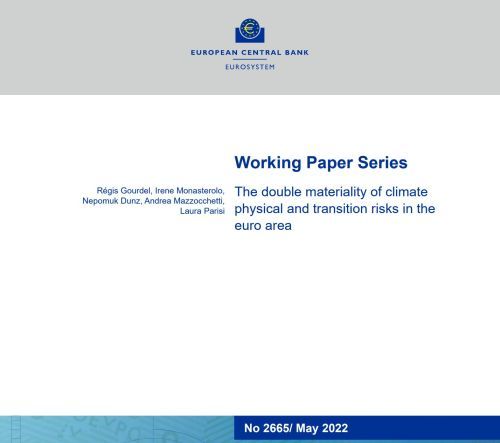
Climate physical & transition risks: Irene Monasterolo, co-author of a European Central Bank (ECB) working paper
Written on 06 Jul 2022.

We are delighted to share a new European Central Bank working paper by Irene Monasterolo, Professor of Finance at EDHEC Business School, EDHEC-Risk Institute on “The double materiality of climate physical and transition risks in the euro area”, joint work with Nepomuk Dunz (The World Bank), Andrea Mazzocchetti (Università Ca' Foscari Venezia), Régis Gourdel (Vienna University of Economics and Business Administration) and Laura Parisi (European Central Bank).
The analysis of the conditions under which, and extent to which climate-adjusted financial risk assessment affects firms’ investment decisions in the low-carbon transition, and the realisation of the climate mitigation trajectories, still represent a knowledge gap.
They provide the first dynamic balance sheets assessment of climate physical and transition risks for the euro area economy and banking sector, implementing the NGFS climate scenarios in the EIRIN Stock-Flow Consistent model.
They introduce the concept of climate sentiments, i.e. firms’ anticipation of carbon price trajectories across scenarios, and their adjustment in investment decisions, and banks’ reaction via lending adjustments.
Below the 3 key messages to be considered:
- Message 1: orderly transition achieves important co-benefits already in mid-term (carbon emissions abatement, financial stability, GDP). In contrast, a disorderly transition can harm financial stability, limiting firms’ capacity to invest in low-carbon activities that could decrease their exposure to transition risk and help them recover from climate physical shocks
- Message 2: firms’ climate sentiments play a key role for smoothing the transition in the economy and finance.
- Message 3: The impact on GDP of orderly and disorderly scenarios is relevant and significant, while the impact on GDP of the hot house world scenario is lower than expected. This result is largely driven by the NGFS scenarios design, calling for a strengthening of climate physical risk assessment in NGFS scenarios,
This is the first analysis that assesses the "double materiality" of climate physical and transition risks in the economy and banking sector, and focuses on the euro area. Importantly, the study analyses the role of investors' climate financial risk assessment and expectations in affecting the transition in the economy and mitigation of physical risks. Finally, it highlights limits of current scenarios and insights to inform macro prudential regulation, says Irene Monasterolo, EDHEC Risk Institute
On June 1, Irene Monasterolo will give a keynote speech on the theme of transition and physical risks at the first international workshop on climate finance, risk and uncertainty modelling organized by Ecole polytechnique. She will present the results of the aforementioned paper on the double materiality of climate risks, which highlights the importance for financial supervisors to consider the role of the finance-economy-climate feedback, especially in the design of appropriate macro-prudential policies to tackle climate risks. Results also point out the urgent need to strengthen climate physical risk scenarios in order to avoid to underestimate risks.

Download the working paper "The double materiality of climate physical and transition risks in the euro area", published as part of the European Central Bank working paper series. The working paper series disseminates economic research relevant to the various tasks and functions of the ECB, and provides a conceptual and empirical basis for policy-making.The working papers constitute “work in progress”. They are published to stimulate discussion and contribute to the advancement of our knowledge of economic matters.
Irene Monasterolo is Professor of Climate Finance at EDHEC Business School and EDHEC-Risk Climate Impact Institute. She writes and researches on topics related to climate change and the financial system, including tail risk scenarios, climate stress test, and green finance policies and regulations. She has developed the climate stress test of the financial system and the EIRIN Stock-Flow Consistent model. Her research is published in leading journals such as Science. Prior to joining EDHEC, she held research positions at the Vienna University of Economics and Business, the International Institute for Applied Systems Analysis and Boston University. Irene also has extensive experience in mainstreaming research results into climate finance policy and risk management. She has collaborated with international and European leading financial institutions, including the World Bank, the European Central Bank, the G20, the European Insurance and Occupational Pension Authority. She is associate editor at Ecological Economics and research area leader for Environment-Economy Interactions at the EAEPE.

